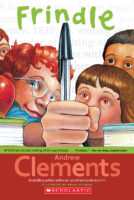In Frindle by Andrew Clements, the main character Nick is a bit of a prankster. As a third-grade student, he transformed his classroom into a tropical paradise. The next year, he taught his classmates to mimic the high-pitched calls of blackbirds. And now, as a fifth grader in Mrs. Granger’s class, he may have finally gone too far. Who would have thought coming up with a new name for “pen” would have such serious implications?
Frindle is a fun, engaging read, yet with challenging vocabulary and idioms central to the plot, it is complex. The story forces students to make inferences to fully comprehend the important themes and ideas it communicates to readers. But as a result of its complexities, the book provides teachers a great opportunity to teach students just how powerful language is.
To inspire students to reflect on Frindle and the power of language to communicate ideas and influence the world around them, here are few prompts and questions to help get the conversation started:
Seeing into the future
How do you think Mrs. Granger is going to be different from Nick’s other teachers? Do you think he will have a good school year?
Analyzing plot
In Chapter 6, the author writes about a memory or flashback to when Nick was 2 years old and used the word gwagala for music. Why is this memory important to the story?
Making comparisons
In the story, Nick’s “word war” with Mrs. Granger was compared to a game of chess. Do you think this is a good comparison? Why or why not?
Making inferences
Being a hero has its price. What price does Nick pay for being a hero?
Thinking critically
How did Nick and Mrs. Granger change throughout the story? What lessons about life did you learn?
After reading and discussing Frindle, encourage students to consider the letter Mrs. Granger writes to Nick at the end of the story, specifically the part where she writes, “A person can watch the sunrise, but he cannot slow it down or stop it or make it go backward.” Ask students to take some time to reflect on those words and, using evidence from the text, write about how the quote relates to Nick and Mrs. Granger’s “word war.”





